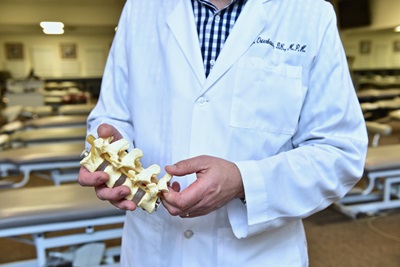Mission Statement
The College of Chiropractic prepares doctors of chiropractic as leaders for the delivery and advancement of natural and holistic approaches to patient-centered health care through excellence in education, professional and scholarly activity, clinical service and community engagement.

Program Learning Outcomes
Within their scope of practice, health care providers who successfully complete the Doctor of Chiropractic program will be able to:
- Assessment and Diagnosis – Demonstrate clinical reasoning skills by gathering and interpreting information from history, physical examination, imaging, laboratory, and other diagnostic tests.
- Management Plan – Demonstrate case management skills by developing, implementing and documenting a patient care plan that addresses the patient’s chief complaint and positively impacts their health and well-being by establishing specific therapeutic goals and prognoses and determining appropriate follow-up, referral, and/or collaborative care.
- Health Promotion and Disease Prevention – Apply epidemiologic principles regarding the nature and impact of health issues in diverse populations, and recognize the impact of biological, chemical, behavioral, structural, psychosocial and environmental factors on general health.
- Communication and Record Keeping – Demonstrate effective oral, written and nonverbal communication skills - with appropriate sensitivity, clarity and control - in a wide range of healthcare related activities, including patient care professional communication, health education, and record keeping and reporting.
- Professional Ethics and Jurisprudence – Demonstrate understanding of and compliance with laws pertaining to practice and business, and exhibit ethical behavior.
- Information and Technology Literacy – Demonstrate information and technology literacy by being able to locate, evaluate and integrate research and other types of evidence, including clinical experience, to explain and manage health-related issues; and use emerging technologies appropriately.
- Intellectual and Professional Development – Demonstrate maturing values and clinical practice skills by seeking and applying new knowledge and adapting appropriately to change.
The College of Chiropractic at Northwestern Health Sciences University is a visionary school whose innovative ideas and practices have led, and will continue to lead, generations of chiropractic doctors to the forefront of their profession. Northwestern’s basic sciences, clinical, chiropractic and business education is superb in preparing students to pass the National Boards and successfully enter clinical practice.
For more than seven decades, excellence has been nurtured and inspired at the College of Chiropractic. The international reputation we have earned has been created in large part by our approach to educating our students.
Northwestern has pioneered an extraordinary and unique clinical system, with the Northwestern Health Clinic - Bloomington, a growing number of interdisciplinary community clinic partnerships, more than 125 community-based private-practice clinics, and final term preceptorship opportunities around the world. The University’s public clinic system is the largest provider of natural health care services in Minnesota.
Northwestern’s Doctor of Chiropractic program is a full-time day program consisting of more than 4,300 contact hours over 10 trimesters. The University admits new chiropractic students in January, May and September of each calendar year. Classes are held Monday through Friday.
Chiropractic students at Northwestern may also complete a bachelor’s of science degree in human biology while enrolled in the chiropractic program.